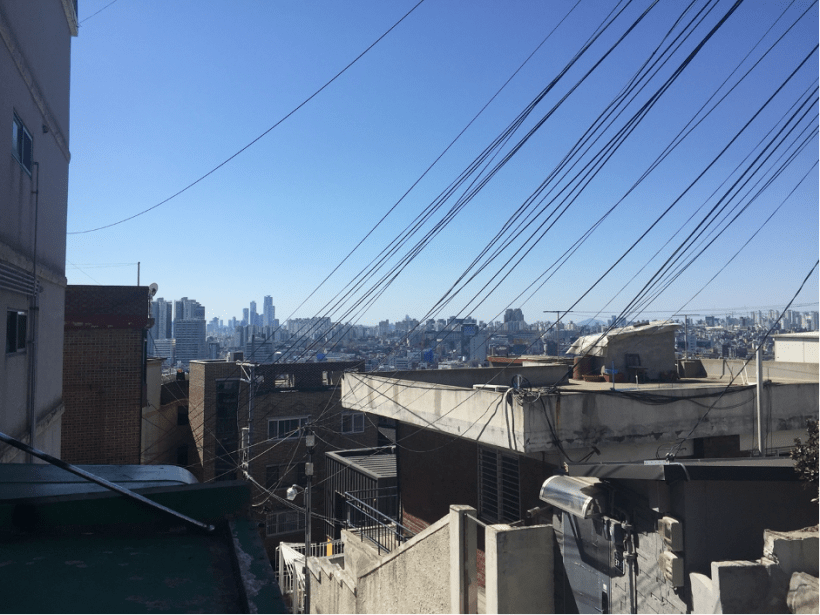In this piece, I document partial biographies of two residents of Seoul that were narrated across the course of fieldwork between 2019 and 2020. These fieldnotes consider what these two interlocutors, at opposite ends of a generation, have to say about the rapid political, social, and economic transformations to have taken place in South Korea across the past 50 years. I draw attention to what Fortis and Küchler (2021) refer to as biographical time, the ways in which persons live in and navigate time. Time is navigated by both an inner experience and by how the passing of time can be gauged in intersubjective and generational ways; particular stoppages caused by the external object world allow a multiplicity of viewpoints. I reflect upon these distinct generational and gendered experiences of growing up in South Korea during two separate periods of structural transformation.
Biographical stoppages mark generational experiences of structural transformation.
Rather than considering how persons are incorporated into grand discourses of structural transformation, I inquire how the partial biographies are situated in relation to the political, industrial, and economic transformations to have taken place across the past 50 years, as biographical stoppages mark generational experiences of structural transformation. I begin with who I will call in this piece The Student, the term by which most of those who are of his age are referred to in South Korea. Those of The Student’s generation are met with the increasing realisation that they only have two options in which to negotiate their future trajectories. This is to either study and labour, and consequently burn out, or to willingly or unwillingly flee self-exploitation (Hae-Joang, 2015, 458). The Student, as I will show, has chosen to pursue the latter option through personal pursuits.
The Student is a 24-year old who is employed at an electronics store in walking distance from his apartment complex in Seoul. Although I refer to him as The Student, he sees himself to have fallen behind his peers with whom he finished high school. He was one of the first among his friends who received a notification that it was his time to enter the military service. When he emerged two years later, most of his friends were about to or had already decided on a direction in which they would take their lives post-university and almost none of them had completed their service. Although military conscription applies from the time Korean men turn 18 or 19, given that most of The Student’s friends did not receive notification for mandatory military conscription some years after him, The Student found it somewhat unusual to have received a notification so early on. Not only did his friends verify that this was a peculiar case, but also that his decision not to defer his service could be seen to be an uncommon choice among young men such as The Student.
Photo by author
The Student often expresses his frustrations over having to assist people who he describes as middle-aged women and men, typically called by the general terms ajumma and ajŏssi. These suggest a particular generational and relational point in one’s life in which one is no longer considered young, but rather, someone who bears familial and societal responsibility. The Student laments that ajumma and ajŏssi often call on the electronics store to order items that cannot be delivered but must be picked up in person at the shop. It is not only this, but he often complains about how he dislikes serving customers in general, even though it is a part of his job and states that during any break he can catch, he will go to the rooftop of the shop for a breath of fresh air and something to eat. Such expressions of frustrations are no desire to change his circumstances in particular, although he often discusses how he will quit his job soon to study or to move to Australia. He has expressed an interest in Perth and in getting to know my friends there, which he imagines is a kind of utopia regarding personal freedom. At the very least, it is a space where he imagines he can pursue his own desires without the pressures of parental guidance and societal norms that limit his possibilities by which to pursue his kkum(dreams) of becoming a film director.
A hegemonic form of maleness became instituted through mandatory military conscription.
Mandatory conscription was introduced through the enactment of the military service law in 1949, which had not been effectively implemented until 1957, given post-war instability (Moon, 2005, pp. 45). Although there had not been such a long history of nation-wide conscription prior to Japanese occupation, it became a prevalent force to producing polarised gendered formations during the emergent years of South Korean industrialisation (Moon, 2005, p. 45). Seungsook Moon (2005, pp. 50-55) argues that the Park Chung Hee years (1961–1979), when the state mandated authoritarian policies including mass-participatory movements toward industrialisation, were the critical time in which a hegemonic form of maleness became instituted through mandatory military conscription and such ideals spread via the media and in education. In that period, South Korean men were expected to perform the ideals of what constitutes a man – and for those who attempted to evade this incurred punishments. For The Student, along with many young men perceive of conscription, his service, as a time that had impeded on his personal pursuit – in his case: film-making.
Neoliberal restructuration had resulted in contradictory and complex conditions.
Others that I had spoken to had not had such an issue with conscription. In fact, they had seen it to just as something one does in the hope of making it out the other side. The Student, however, was adamant to pursue his dream, and this might have as much to do with the limitations and potentialities imposed on those of his generation through the implementation of neoliberalism during what South Koreans refer to as the IMF (International Monetary Fund) period. Since 1987, when the South Korean market opened up to international trade, the IMF led neoliberal restructuration in the early 2000’s and the democratisation process that was integral to this time had altered the forms of work to eradicate life-time job security and produced emergent conditions of job casualisation (Lee, 2010, pp. 30-33; Song, 2010, pp. 2-3). The generation of youths that was immediately afflicted by these changes, who many had referred to as the ‘new generation’, quickly adapted to the possibilities that the changes made available, and embraced the desire to express themselves through appearance, cultural taste, and refutation of social norms (Hae-Joang, 2015, 438). Hae-Joang (2015, 455) suggests that the generation that followed had already been incorporated into neoliberal logics that transformed Korean children into workers who met the demands of the neoliberal economy. Although neoliberal restructuration had resulted in contradictory and complex conditions, produced through unstable labour conditions and new forms of creative expression among youths, The Student diverges from his generation in that rather than pursuing the acquisition of professional specialisations through time management and respect for his parent’s wishes, he had utilised his time working at an electronics store in order to consider the best way toward pursuing his dream.
What she does have in common with the women of her generation is what Abelmann calls a melodramatic sensibility.
The Food Cart Vendor is a 72-year old woman who runs a food cart on the sidewalk of a neighbourhood in Seoul. I lack sufficient ethnographic resources to fully account for The Food Cart Vendor’s life trajectory and her subjecthood. As an unmarried woman who has spent the past 40 years in Seoul working at various side street food vendors to make a living, she never fulfilled the social expectations of marriage instilled in family and nation-building that many of the women who belong to her generation had come to negotiate. What she does have in common with the women of her generation is what Abelmann calls a melodramatic sensibility. The Food Cart Vendor’s biographical talk and her enormous capacity for self-reflection denote the gendered tension and ambivalences of daily life (Abelmann, 2003, 283). For The Food Cart Vendor, just as the women of Abelmann’s ethnography, does not represent economic and political dispossession, nor does she consider herself an activist. And yet, this ordinariness can take on dramatic sensibilities. For The Food Cart Vendor, never having married is an ambivalent fact, and in her struggles on the sidewalk to make a living she is less concerned with never having married than with paying the rent of her tchokpang (a small one-room space with shared bathroom and kitchen). The Food Cart Vendor’s life trajectory is not so much a political move toward activism. But it does reflect a gendered generational consequence of not having married given that the resources of her family home were transmitted to her older brothers. Within The Food Cart Vendor’s personal and biographical stops, the ordinariness of her daily life is intertwined with gendered struggle, located in the ambivalences and dramas of daily life.
In her struggles on the sidewalk to make a living she is less concerned with never having married than with paying the rent of her tchokpang.
Jesook Song’s ethnography provides some anthropological clues as to why unmarried women of The Food Cart Vendor’s generation are absent from ethnographies of South Korea. It is not as such that unmarried women of her generation do not exist in South Korea. What Song’s ethnography reveals is how the particular biographical stoppage of neoliberalism allows us to see the divergent forms of female subjectivity across these two periods of social, political and economic transformation. It thereby allows one to gauge the kinds of conditions under which The Food Cart Vendor spent her youth. Jesook Song (2014, p. 78), for instance, documents the women who continued to pursue personal affectations as their lifestyles converged with the production of plastic subjects, the fitting and moulding of persons into unstable job markets in the emergence of neoliberal capitalism in South Korea. This convergence overshadowed the leftist-leaning attempts to counter authoritarian and capitalist production, as when women sought out ways of integrating their personal pursuits for leisure (such as travel and alternative forms of communal life) that aligned with their personal identifications of pihon yosong (un-associated with marriage).
The ordinariness of her daily life is intertwined with gendered struggle.
This form of identification intentionally rejected the normative familial expectations of seeking out economic stability through marital life (2014, p. 21-27). Song shows how women who identify as pihon yosong instead negotiate the constant challenges by men at the workplace as well as those of family members who criticise their active disinterest in marital life, and their pursuit of living alone. Pihon yosong provides some clues as to why women such as The Food Cart Vendor are so rarely encountered in ethnography of South Korea. Pihon yosong is a form of identification that emerged out of the IMF and neoliberal structural changes, marking a point when female social formations could diverge from widespread state-produced female subjectivity during industrialisation, aimed at inculcating normative reproductive and domestic duties for women (Moon, 2005, 75). This is further reflected in the state’s active shaping of feminine subjectivities through calls for rational household management during the years in which The Food Cart Vendor spent her youth (Moon, 2005, 90).
Acknowledgements
For The Food Cart Vendor, to whom I promised a short visual piece but whose story is better captured here.
References
Abelmann, N 2003, The Melodrama of Mobility: Women, Talk, and Class in Contemporary South Korea, University of Hawai’i Press, Honolulu.
Fortis, P, & Küchler, S 2021, ‘Introduction’, in P Fortis & S Küchler (eds.), Time and its Objects: A Perspective from Amerindina and Melanesian Societies on the Temporality of Images, Routledge: Taylor & Francis Group, London and New York, pp. 1-20.
Hae-Joang, C 2015, ‘The Spec Generation Who Can’t Say “No”: Overeducated and Underemployed Youth in Contemporary South Korea’, Positions: Asia Critique, vol. 23, no. 3, pp. 437 – 462.
Lee, K-K 2010, ‘Neoliberalism, the financial crisis, and economic restructuring in Korea’, in J Song (ed.), New Millennium South Korea: Neoliberal Capitalism and Transnational Movements, Routledge: Taylor & Francis Group, London and New York, pp. 29-45.
Moon, S 2005, Militarized Modernity and Gendered Citizenship in South Korea, Duke University Press, Durham.
Song, J 2010, ‘Introduction: why Korea in the new millennium?’, in J Song (ed.), New Millennium South Korea: Neoliberal Capitalism and Transnational Movements, Routledge: Taylor & Francis Group, London and New York, pp. 1-7.
Song, J 2014, Living on Your Own: Single Women, Rental Housing, and Post-Revolutionary Affect in Contemporary South Korea, Suny Press, Albany.
Featured Image by Guillermo Pérez on Unsplash






